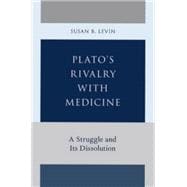While scholars typically view Plato's engagement with medicine as uniform and largely positive, Susan B. Levin argues that from the Gorgias through the Laws, his handling of medicine unfolds in several key phases. Further, she shows that Plato views medicine as an important rival for authority on phusis (nature) and eudaimonia (flourishing). Levin's arguments rest on careful attention both to Plato and to the Hippocratic Corpus.
Levin shows that an evident but unexpressed tension involving medicine's status emerges in the Gorgias and is explored in Plato's critiques of medicine in the Symposium and Republic. In the Laws, however, this rivalry and tension dissolve. Levin addresses the question of why Plato's rivalry with medicine is put to rest while those with rhetoric and poetry continue. On her account, developments in his views of human nature, with their resulting impact on his political thought, drive Plato's striking adjustments involving medicine in the Laws.
Levin's investigation of Plato is timely: for the first time in the history of bioethics, the value of ancient philosophy is receiving notable attention. Most discussions focus on Aristotle's concept of phronêsis (practical wisdom); here, Levin argues that Plato has much to offer bioethics as it works to address pressing concerns about the doctor-patient tie, medical professionalism, and medicine's relationship to society.








